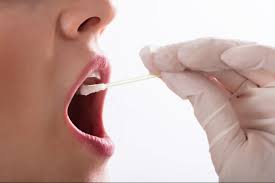When it comes to diagnosing oral diseases, early detection is key to successful treatment. Traditionally, this has relied on visual examinations, biopsies, and imaging techniques. However, a groundbreaking advancement is changing the game: salivary biomarkers. These tiny molecules in saliva can provide critical insights into your oral and overall health, making saliva testing a powerful tool for oral disease detection. In this blog, we’ll explore how salivary biomarkers work, their benefits, and why they’re transforming the way we diagnose and manage oral diseases.
What Are Salivary Biomarkers?
Salivary biomarkers are biological molecules found in saliva that can indicate the presence of disease or changes in the body. These biomarkers include proteins, DNA, RNA, and metabolites, which can be analysed to detect conditions like gum disease, oral cancer, and even systemic illnesses such as diabetes or cardiovascular disease.
Saliva is an ideal medium for testing because it’s easy to collect, non-invasive, and contains a wealth of information about your health. By studying salivary biomarkers, researchers and clinicians can identify diseases at their earliest stages, often before symptoms appear.
How Saliva Testing Works
Saliva testing involves collecting a small sample of saliva, usually by spitting into a sterile container or using a specialised swab. The sample is then analysed in a laboratory to identify specific biomarkers. Advanced technologies, such as genomics, proteomics, and metabolomics, are used to detect and measure these biomarkers with high precision.
For example, elevated levels of certain proteins in saliva may indicate inflammation associated with gum disease, while the presence of specific genetic markers could suggest the early stages of oral cancer.
Benefits of Salivary Biomarkers in Oral Disease Detection
- Early Detection: Salivary biomarkers can identify diseases at their earliest stages, improving the chances of successful treatment.
- Non-Invasive: Unlike biopsies or blood tests, saliva collection is painless and stress-free.
- Convenience: Saliva testing can be done quickly and doesn’t require specialised equipment or extensive training.
- Cost-Effective: It’s generally more affordable than traditional diagnostic methods.
- Comprehensive Insights: Saliva contains a wide range of biomarkers, providing a holistic view of oral and systemic health.
Applications of Salivary Biomarkers in Dentistry
Salivary biomarkers are being used to detect and monitor a variety of oral diseases, including:
- Gum Disease: Biomarkers like cytokines and enzymes can indicate inflammation and infection in the gums.
- Oral Cancer: Genetic markers and proteins in saliva can help identify early signs of oral cancer.
- Tooth Decay: Changes in saliva composition can reveal an increased risk of cavities.
- Systemic Diseases: Saliva testing can also detect biomarkers linked to conditions like diabetes, HIV, and autoimmune disorders.
By integrating saliva testing into routine dental check-ups, dentists can provide more personalised and proactive care.
The Future of Salivary Biomarkers
The field of salivary biomarkers is rapidly evolving, with ongoing research exploring new applications and technologies. For example, scientists are developing portable devices that can analyse saliva in real time, making testing even more accessible. Additionally, artificial intelligence is being used to interpret complex biomarker data, improving diagnostic accuracy.
As these advancements continue, saliva testing is poised to become a standard tool in both dentistry and medicine, revolutionising the way we approach oral disease detection and overall health monitoring.
Why Salivary Biomarkers Matter
For patients, the benefits of salivary biomarkers are clear: earlier diagnosis, less invasive testing, and better outcomes. For healthcare providers, they offer a powerful tool for improving patient care and reducing healthcare costs.
By catching diseases early, we can prevent complications, reduce the need for invasive treatments, and ultimately improve quality of life. This makes salivary biomarkers a game-changer in the fight against oral and systemic diseases.
Salivary biomarkers are transforming the way we detect and manage oral diseases, offering a non-invasive, convenient, and highly effective approach to diagnosis. From gum disease to oral cancer, saliva testing is providing critical insights that were once impossible to obtain without invasive procedures.
If you’re due for a dental check-up, ask your dentist about the potential of salivary biomarkers. It’s a small step that could make a big difference in your oral and overall health.

